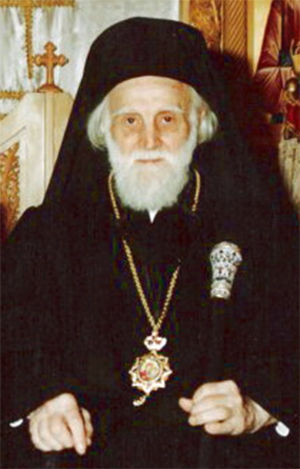After His resurrection, when our Lord appeared to His disciples, He blessed them saying, “Peace be unto you” (Luke 24:36, John 20:19). These words of blessing were the first spoken words of our Lord to the apostles after His resurrection. So now that we are in the after-feast of Pascha—the Resurrection of our Lord, it seems fitting to write something on this subject. As a start I want to recount conversations with two bishops who had acquired a state of peace and then add a few quotes from instructions of St. Seraphim of Sarov.
 Archbishop Victorin So I will first say something about the late Romanian Archbishop Victorin. While I was at St. Tikhon’s Monastery he would usually be there for the pilgrimage on Memorial Day weekend. He would travel quite humbly, taking a bus and ask to be picked up from the bus station. Such pilgrimages are normally over busy and the Liturgies with a large number of bishops tend to be somewhat chaotic. Archbishop Victorin never appeared to lose his composure and remained peaceful. I remember one of the servers who helped with the vesting of the bishops was amazed to see how peaceful he was. So I asked the Archbishop how to acquire peace. He first asked me where I lived. When I told him here at the monastery he said, “Fulfill all your obediences with a good conscience.” And he added a few profound words: “Be patient every day in every thing.” It sounds so simple, yet so difficult to attain.
Archbishop Victorin So I will first say something about the late Romanian Archbishop Victorin. While I was at St. Tikhon’s Monastery he would usually be there for the pilgrimage on Memorial Day weekend. He would travel quite humbly, taking a bus and ask to be picked up from the bus station. Such pilgrimages are normally over busy and the Liturgies with a large number of bishops tend to be somewhat chaotic. Archbishop Victorin never appeared to lose his composure and remained peaceful. I remember one of the servers who helped with the vesting of the bishops was amazed to see how peaceful he was. So I asked the Archbishop how to acquire peace. He first asked me where I lived. When I told him here at the monastery he said, “Fulfill all your obediences with a good conscience.” And he added a few profound words: “Be patient every day in every thing.” It sounds so simple, yet so difficult to attain.
I also once questioned Bishop Basil Rodzianko about the same. Let me say a few words of introduction of what I know about Bishop Basil. This is the Bishop Basil spoken of in the popular book “Everyday Saints” by Archimandrite (now Bishop) Tikhon of Sretensky Monastery in Moscow. As a priest in Russia during communist times he was a renown preacher. He was targeted by the communist and his son was killed by a bomb meant for him. Leaving Russia he spent time in a displaced persons camp. Afterwards he lived first in England and then in America. During this time he worked on broadcasting into Soviet Russia striving to keep the Orthodox Faith alive there and he often traveled giving talks. He acquired such a state of peace that while he was laughing one could visibly see that he continued in that state. It was while he was giving a talk at St. Tikhon’s that I was able to speak a bit with him privately. So I asked him: “Vladika I see you have peace I want this peace, how can I have this peace?”
 Bishop Basil He first raised his eyes looking this way and that way as if, with his gestures, he were saying: “Who me?” Then he spoke. “This peace is in the Holy Spirit. We begin every service with ‘O Heavenly King’ asking the Holy Spirit to come and abide in us. The Holy Spirit is God; One of the Holy Trinity together with the Father and the Son. The Holy Spirit brings the peace of God to us. If you believe this you can have this peace.”
Bishop Basil He first raised his eyes looking this way and that way as if, with his gestures, he were saying: “Who me?” Then he spoke. “This peace is in the Holy Spirit. We begin every service with ‘O Heavenly King’ asking the Holy Spirit to come and abide in us. The Holy Spirit is God; One of the Holy Trinity together with the Father and the Son. The Holy Spirit brings the peace of God to us. If you believe this you can have this peace.”
Then he continued, “The thoughts that go through our mind can cause us to lose the peace of God. These are not our thoughts but if we accept them they enter our heart and become a part of us. If you sin you lose the peace of God and if you commit a big sin it takes a long time to regain the peace of God.”
Let us now hear a few words from St. Seraphim concerning peace. These are taken from his instructions as they appear in the book: In the Footsteps of a Saint (St. Tikhon’s Seminary Press 2006). There are some applicable words in the section, “Concerning Renunciation of the World”:
The fear of God is obtained at the time when a man, having renounced the world and all that is in the world, focuses all his thoughts and feelings on the one notion of the law of God, wholly immersing himself in contemplation of God and in perceptions of the blessedness promised by the saints.
It is impossible to renounce the world and to come to a state of spiritual contemplation while remaining in the world. For as long as the passions are not calmed it is impossible to acquire peace of soul; and the passions are not quieted as long as we are surrounded with things that arouse the passions. In order to come to perfect passionlessness and attain perfect stillness of soul, it is necessary to struggle much in spiritual reflection and prayer. But how is it possible to wholly and serenely immerse oneself in the contemplation of God and instruction in His law, and to lift one’s whole soul to Him in ardent prayer, while remaining amidst the incessant noise of the passions warring in the world? The world lies in evil. (p. 24)
Concerning peace of soul, St. Seraphim says:
 If a man does not abandon worldly concerns he cannot have peace of soul. Peace of soul is attained through afflictions. The Scriptures say, “We have gone through fire and water and Thou hast led us to rest” (Ps. 65:12). He who desires to be pleasing to God must pass through many afflictions. How can we extol the martyrs for the suffering that they endured for the sake of God is we are not able to endure a little fever?
If a man does not abandon worldly concerns he cannot have peace of soul. Peace of soul is attained through afflictions. The Scriptures say, “We have gone through fire and water and Thou hast led us to rest” (Ps. 65:12). He who desires to be pleasing to God must pass through many afflictions. How can we extol the martyrs for the suffering that they endured for the sake of God is we are not able to endure a little fever?
Nothing is so helpful in the acquisition of interior peace as silence, and to keep conversations with others as short as possible; but one should converse with oneself unceasingly.
Nothing is better than peace in Christ, for in it every warfare of the spirits of the air and earth is destroyed. “For we wrestle not against flesh and blood but against principalities, against powers, against rulers of the darkness of this world, against spiritual wickedness in high places.” (Eph. 6:12).
The sign of a wise soul is when a man has his mind descend within himself and has activity in his heart. Then the grace of God envelops him and he abides in a peaceful state and through it in a most peaceful state. In a peaceful state, that is, with a good conscience. In the most peaceful state since the mind contemplates within itself the grace of the Holy Spirit, in accordance with the word of God: “His place is in peace” (Ps. 75:3) (pp. 28-9)
When St. Seraphim speaks of a good conscience it is doubtful that he means on a merely psychological level. Before this he speaks of a man having his mind descend within himself and having activity in the heart. It is more likely he means to be in a state of “standing with the mind in the heart before God”—to use an expression of St. Theophan the Recluse. One will thus feel as though they are living in the presence of God and according to His will and have peace. To transgress the conscience will destroy this state, but to remain in it will prepare one to receive more grace—a deeper state of peace. One will no longer just be standing before God but could actually participate in His action within. Perhaps this is what David meant: “Be still and know that I am God” (Ps. 45:11)




